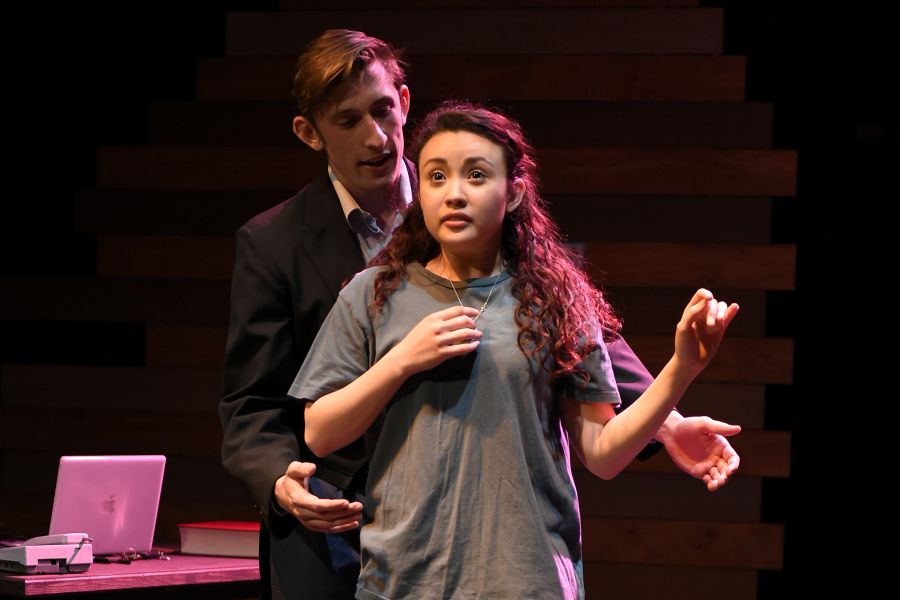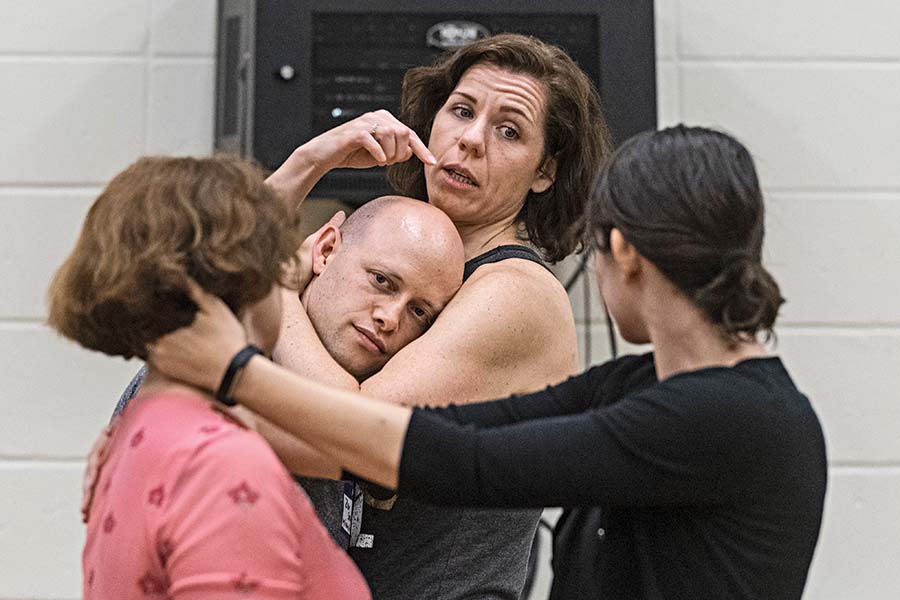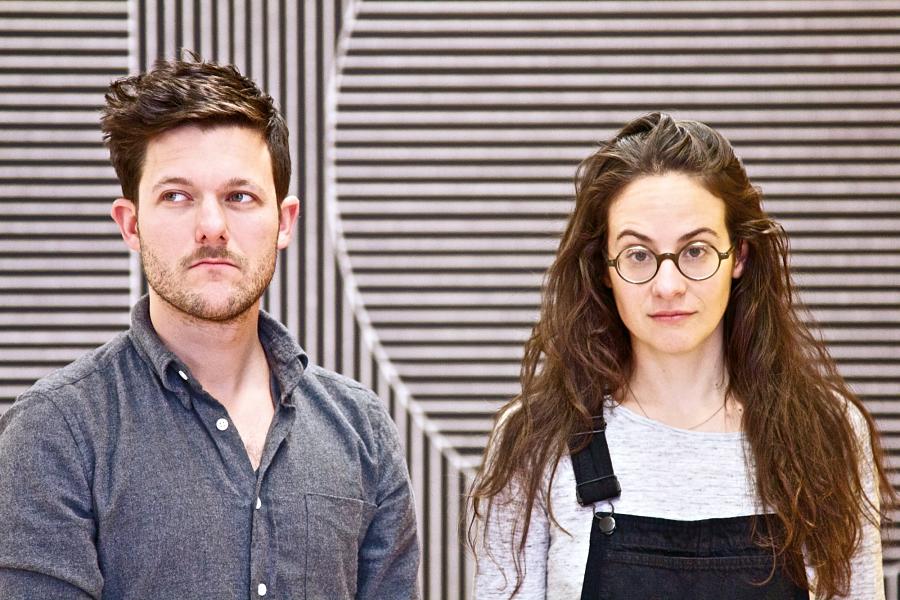Maybe it starts with a breath. The exhale after an intense scene. The inhale from a line delivered effortlessly. Actor and character meld, the play comes to life, this cast feels like family, and that one talented collaborator in particular—well. Maybe they start to have a different glow. Their laugh is a little lighter. Their voice and mannerisms become so familiar and comfortable, as if a bond has always been there and just needed the show to coax out this connection.
Maybe the realization comes on the way home. Maybe during tech week. Eventually it sets in. Someone’s got a show crush.
It’s easy to overlook or downplay the show crush, to dismiss it as mere fleeting emotions, to relegate it to the domain of adolescence and youth, or to focus on broader or more public forms of attraction, such as celebrity crushes or fandom. In fact, the show crush is a powerful phenomenon, often private and internally held, that exists uniquely in theatrical spaces and can have far-ranging impact on people’s personal, professional, and creative lives.
So what exactly is a show crush?

“In my head, a show crush is an illusion that gets broken when the illusion of the play subsides,” explains playwright Hannah C. Langley, who wrote Losing My Religion (In 140 Characters or Less). In this dark romantic comedy, a young Christian evangelical woman attempts to convert a young Jewish man via social media, only to develop a crush that becomes a catalyst for personal transformation. “Depending on the power of the piece,” Langley continues, “that show crush could be your illusion, because you could still frame that person in their character or role. But that’s not them. It’s an idea.”
It also differs from a “showmance,” mutual attraction that is emotionally (and at times physically) reciprocated between two individuals and has more potential to become public or develop into a deeper relationship beyond the show. More often, the show crush is one-sided and concentrated in an individual’s mind and feelings.
Intimacy coordinator and cultural sensitivity specialist Ann James also emphasized the illusory quality of the show crush and how it can contrast with our bodily experiences.
“A show crush develops based on proximity of acting partners to intimate material, and how that material kind of hijacks their hormonal system and gives them false feelings of connection that then turn into possibilities,” James explained. In the process of making the play, imagination takes flight into dreamy territory and heightened emotions.
These emotions can cause theatre professionals of any age to act in a range of ways, leading to situations that can be beautiful, painful, or messy—depending on how people handle them.
“In an ideal rehearsal space, we are provided with the opportunity and the container to show up as the best version of ourselves in a creative, collaborative, positive, vulnerable way,” said director and intimacy coordinator Carly Bones. “We create ephemeral families as a cast. That’s one layer of the show crush. When people are playing opposite each other, that’s a very specific kind of show crush from an intimacy director standpoint.”
Incidentally, Bones fell in love with her husband while she was directing Othello and he was playing the lead; the two had been friends and collaborators before the show. As Bones described the early stages of their romantic relationship, she radiated delight and giddiness.
“At first, I was so happy to get to know him more—he spoke Shakespeare so beautifully,” she recalled. “He was such a generous ensemble member, both in and out of rehearsal, and he brought all of himself and I was like, ‘Oh, what a beautiful gift to see this.’ We realized we were falling for each other right before tech week, and my boundary was: Cool, we can start dating once the show is open.”
It’s important to note several elements that helped this show crush turn out positively: The couple knew each other as friends outside of the confines of the production itself, and they set boundaries between their personal and professional roles to ensure that the show continued smoothly for everyone involved.
“You have to be present and vulnerable at the same time...When we build a container of boundaries, it’s a way to respect ourselves, our instrument, and our collaborators in the work.”
Sometimes show crushes don’t go so smoothly. One anecdote that arose in my interviews involved two actors playing love interests in a show who began to practice outside of rehearsal. “That’s the first red flag,” noted James. “You should always have three parties present in a rehearsal process when it comes to intimacy.” The actors began going on pretend dates to be in character. Eventually one actor broke off their engagement to their real-life partner, and the other actor divorced their spouse (who then moved out of the country with their children). The two actors did eventually marry and start a new family.
It’s important to approach stories like this with grace and without judgment. “Love is love if love is going to happen,” James added. “But let’s not be lazy about parameters of the intimacy design so that things happen. We’re in an imaginary situation that comes from a playwright’s brain. The more you want to make it real by having private meetings and dates to talk about the relationship, the more we put the whole production in danger of imploding because of a showmance gone wrong, or of an artistic coupling gone wrong.”
Similarly, Bones noted, there has been an aesthetic and cultural shift away from the idealization of actors losing themselves in their characters.
“Good acting, and especially good chemistry between actors—you have to be present and vulnerable at the same time,” she said. “If you’re pushing on that trauma or lust all the time, your body and nervous system will shut down and you lose access to your instrument. When we build a container of boundaries, it’s a way to respect ourselves, our instrument, and our collaborators in the work.”
One opportunity to reflect on how theatremakers build—and break—these ephemeral containers came in October 2023, when I saw Measure Still for Measure, written and directed by Jessica Kubzansky, artistic director of Boston Court Pasadena. After seeing this show, I half-joked to friends, “This is about a show crush gone terribly wrong.” In all seriousness, it became an entry point for discussion questions and stories around attraction spurred on by fictional settings, real emotions, and temporary power dynamics.
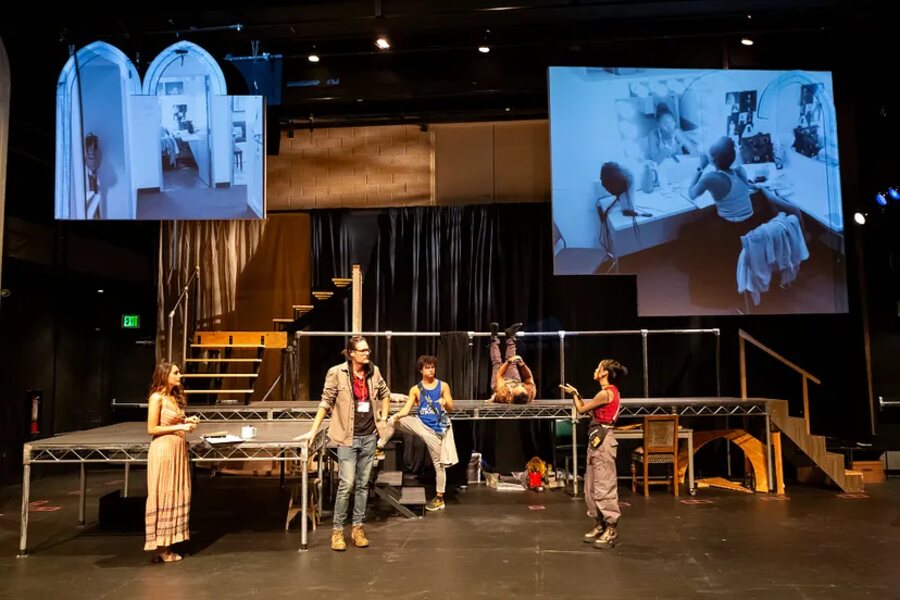
Kubzansky’s immersive play led the audience from Boston Court Pasadena’s parking lot to its rehearsal room and finally onto its stage (where we also saw live feeds of the sacrosanct dressing rooms) while a company of actors prepared their production of Shakespeare’s Measure for Measure, a “problem play” in which a moralist authority figure, enamored of a young novitiate, pressures her into sex in return for her brother’s life.
The original play is rife with themes about power dynamics, sexual harassment, bodily autonomy, and consent; Kubzansky’s play transposes the Shakespeare plot and topics onto the dynamics of a theatrical cast, exposing their various intersectional identities and levels of agency. When the Measure for Measure director takes his own feelings for the lead actress too far during a dress rehearsal, it’s a murky and disturbing moment that blurs fiction, reality, false intimacy, work, and entertainment. It hits close to home not only for theatremakers but for anyone touched by the #MeToo movement.
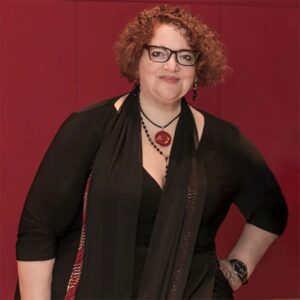
I shared my quip about the show with Kubzansky, and delved deeper into the differences between show crushes, showmances, and attraction arising from the play-making process.
“Are we talking about having a show crush, or about if a show crush starts to get acted on in a way that becomes visible to the company?” she replied. Either way, she continued, “It’s all about not getting in the way of the room. If the show crush starts getting in the way of doing the work of enacting the play and pulling focus inappropriately, that’s when it becomes a problem.”
After all, if you have a show crush and nobody knows, does it matter?
On one level, no. Many show crushes truly are fleeting, enduring for the course of a show and finishing shortly thereafter. Actor JB Tadena, who worked in theatre in Washington, D.C., and Los Angeles prior to landing a role in the CW television drama Kung Fu, hasn’t had a show crush, but remembers being crushed on.
“I was oblivious to it for a bit,” he said, “then everyone noticed, and I started to see the signs. I didn’t want to lead anybody on, and she never said anything to me, just other people, and I think she let it go after a certain point when I wasn’t reciprocating, which is healthy.”
Having played a romantic love interest in Kung Fu, Tadena broke down the process like preparing for any other role: reading the script repeatedly, analyzing the character, and building rapport based on natural chemistry and charisma with John Prasida, the actor playing his love interest. He noted the multiple layers of actor and character converging into one person. “John is the character,” he said. “I don’t really separate the two when I’m working because I have to love these things about him. It has to be real for me in that sense.” At the same time, he develops rapport and friendship with the actor as a person off the set.
Tadena singled out another quality of the show crush which may make it more common in theatre than in other mediums. “In film and TV, sometimes you just go to work, sit in a trailer for most of the time, act, go to your trailer, and you go home,” he said. “In theatre, you’re always with everybody.”
Even so, show crushes can remain invisible to others. Choosing not to display or act on a show crush doesn’t make it any less real, though, as it can still stir up powerful feelings and physiological responses in the person experiencing it. Take, for instance, the experience of the playwright.
“A lot of writing—creating anything—is wish fulfillment,” Langley said. She explained that in her dark romantic comedy, the protagonist was based on a younger version of herself, and the experience of witnessing the play embodied made her realize how much growth the characters needed. “The thing about a character in the play is that they’re not there—the burden of full humanity is not on them. If you create a character who is romancing someone, or based on someone who you loved in the past, and you see [an actor] doing it over and over again, getting better and better at embodying all these wonderful things about that past person or idea, it becomes real to you in the form of biological responses—you get a little heart flutter, you get a little hot. It gets confusing, because you’re like, do I love insert-actor-name here? Or do I love this character I already knew I loved because I made them; I Pygmalion-ed them out of nothing?”
Sometimes the confusion can lead to feelings of loneliness and shame, especially if the parties involved are in relationships or if negative emotions interfere with the creative process.
“Make sure you don’t get lost in the process of having these feelings and that you are journaling, speaking to friends, not isolating yourself, being social, and listening to the community of your friends,” James recommended. “The last thing we want to do is pile a whole lot more shame on top of someone having genuine feelings.”
“I don’t think there’s anything wrong with the show crush. The wrongness happens when it becomes an active pursuit where you can’t safely make art in a space where you have power over the other person romantically or sexually.”
If a cast or crew member were to admit a show crush to her, James’s advised response was full of tenderness and care. “First of all, I would say, ‘Congratulations, your emotions are working!’ I would advise them to really think about the risk involved of changing the dynamic of the group with these feelings, and if there’s anything they can do to give themselves time to really contemplate the value of doing the work as a professional and to be in grace for themselves.”
“I don’t think there’s anything wrong with the show crush,” Langley emphasized. “The wrongness happens when it becomes an active pursuit where you can’t safely make art in a space where you have power over the other person romantically or sexually. You could probably make interesting art, but it won’t be safe or ethical. And safety means that you can feel free to say no at any beat.”
Bones also recommended de-roling practices and somatic rituals to release the character’s energy from one’s body, whether that energy be romantic, sexual, traumatic, grief-filled, or full of other intense emotions.
“For instance, I use character names and not actor names to hold that boundary,” she explained. “And in the de-roling, we have time, even if just for a few breaths of releasing the character from their body or brushing or shaking it off. Just giving a moment to say, ‘Did anything come up in your body that you don’t need to hold onto outside of the work?’” These practices, she said, help create healthy containers for all theatremakers involved to continue showing up to work as their best selves.
So: Show crushes are a normal part of theatremaking. Even if they don’t arise, there’s no question that strong bonds and feelings among the cast and crew can continue long after the curtain comes down.
“In joyous rehearsal rooms, everybody falls a little in ‘talent love’ with each other in the community that is making the play together,” said Kubzansky, who has served as the minister for several weddings of actors who met in plays she directed (a joyous outcome of show crushes). “It’s a beautiful experience, communication is good, and everyone feels safe and respected. I think there’s a reason why, shortly after a play concludes, the artists try to get together. They love each other because they’ve been through something unique, deep, vulnerable, intimate together.”
Amanda L. Andrei (she/her) is a playwright, literary translator, and theatre critic based in Los Angeles.
Support American Theatre: a just and thriving theatre ecology begins with information for all. Please join us in this mission by joining TCG, which entitles you to copies of our quarterly print magazine and helps support a long legacy of quality nonprofit arts journalism.
Related

Rude Mechs Plans to ‘Crush It’ With Mobile 2017-18 Season
After losing its longtime home, the Austin theatre collective will hold events around the city next season.
In "Seasons"

VR: A Space to Create (and Escape) During the Pandemic
From cockroaches to Greek myths, virtual theatre productions are offering theatremakers and audiences a way to connect.
In "Media"

With (Robot) Love From Korea
The new show 'Maybe Happy Ending' at the Alliance in Atlanta puts a fresh East-West spin on the American musical.
In "January/February 2020"

